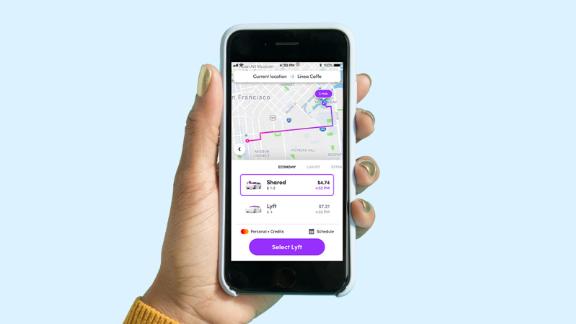CNN Underscored reviews financial products such as credit cards and bank accounts based on their overall value. We may receive a commission through the LendingTree affiliate network if you apply and are approved for a card, but our reporting is always independent and objective.
Whether you’re new to credit card rewards or an expert in the field, both the Chase Freedom Flex and the Chase Freedom Unlimited credit cards are very enticing when it comes to earn cash back on everything you buy. But picking the one that will help you maximize your credit card rewards is vital. So what are the differences and which one is right for you?
To answer that question, we’ve detailed the pros and cons of these two cards, including each card’s everyday earning rates, bonus categories and other card benefits to help you determine which card best fits your spending habits.
Chase Freedom credit cards
On the surface, the Chase Freedom Flex and the Chase Freedom Unlimited actually look quite similar. They both carry the Freedom name. They both come with no annual fee. And they both offer the opportunity to earn rewards in the form of Chase Ultimate Rewards points that can be redeemed for cash back, or for travel and in other categories at a higher rate when paired with another premium Chase credit card (more on that in a moment).
But there are some differences. So first, let’s take a look at the key details of these two cards side by side:
You’ll notice that with both cards, you’ll earn 5% cash back on travel booked through Chase Ultimate Rewards, 3% cash back on dining at restaurants (including takeout and eligible delivery services) and 3% cash back at drugstores. So when it comes to those three categories, the Chase Freedom Unlimited and the Chase Freedom Flex are completely identical.
But the real difference lies in two other areas. One is the rotating bonus categories that come with only the Chase Freedom Flex, which change each quarter. You can earn 5% cash back in these rotating categories, up to $1,500 in combined purchases every quarter.
Examples of past rotating categories include gas stations, department stores and Amazon, but in the July through September 2021 time frame, the Freedom Flex bonus categories are grocery stores (excluding Target and Walmart) and select streaming services.
See if you qualify for the Chase Freedom Flex credit card.
The second area where these two cards drastically differ is how many rewards you’ll earn in the non-bonus categories. This is where the Chase Freedom Unlimited has a leg up, as you’ll earn 1.5% cash back on all your purchases that don’t fall into the bonus categories, whereas the Chase Freedom Flex earns only 1% for those same purchases.
See if you qualify for the Chase Freedom Unlimited credit card.
Although both cards advertise themselves as being “cash back” credit cards, they technically earn Chase Ultimate Rewards points that can be redeemed for cash back at a rate of 1 cent per point. You can also redeem your points for gift cards, or through programs such as Amazon’s Shop with Points, which sometimes offers discounts to targeted card holders for using points.
Related: Save money at Amazon when using your Chase credit card.
However, if you also have a premium Ultimate Rewards credit card — one that charges an annual fee, such as the Chase Sapphire Preferred Card, the Chase Sapphire Reserve or the Ink Business Preferred Credit Card — you can transfer your points earned from the Chase Freedom Unlimited or Chase Freedom Flex into those accounts.
Then you can redeem your points for travel or in other categories through Chase’s “Pay Yourself Back” tool at a significantly higher rate than just 1 cent per point. And you can even transfer your points to any of Chase’s 13 hotel or airline loyalty programs and potentially get even more value for them.
Related: Chase Sapphire Preferred vs. Chase Sapphire Reserve: Which is best for you?
Chase Freedom sign-up bonuses
Both the Chase Freedom Flex and Chase Freedom Unlimited are offering the exact same sign-up bonus. With both of these cards, you can earn $200 in bonus cash back (which is technically 20,000 Ultimate Rewards points) after spending $500 on your card within the first three months after opening the account.
As a new card holder, you’ll also earn 5% cash back on grocery store purchases (not including Target or Walmart) on up to $12,000 spent in the first year. That means you could potentially earn as much as $600 in additional bonus cash back if you’re a family that spends $1,000 on groceries each month.

Those are great bonus offers for two cards that have no annual fee. Plus, the $500 spending requirement is relatively low, so most people should be able to easily meet it within the three-month timeframe.
Click here for the bonus offer on the Chase Freedom Flex.
Click here for the bonus offer on the Chase Freedom Unlimited.
Chase Freedom card benefits
Although these two Freedom cards are both issued by Chase, they run on different card networks — the Chase Freedom Unlimited is a Visa, while the Chase Freedom Flex is a Mastercard. That means the benefits do vary quite a bit between the two cards.
Let’s start with the benefits that the two cards share. Both cards offer three months of complimentary DashPass — which is DoorDash’s food delivery subscription service — along with 5% cash back on Lyft rides through March 2022. You’ll also get secondary car rental insurance, up to two years of extended warranty protection and trip cancellation and interruption insurance.
Related: Are you using the best credit card when ordering food for delivery?
You’ll also have access to purchase protection when you use your Chase Freedom Flex or Chase Freedom Unlimited to make purchases. This benefit covers any new purchase against damage or theft for 120 days, up to $500 per claim and $50,000 per account.
But the Chase Freedom Flex also comes with a handful of additional World Elite Mastercard benefits that you won’t see on the Chase Freedom Unlimited. The best one is cell phone insurance. As long as you pay your monthly cell phone bill with your Chase Freedom Flex card, you’re covered if your cell phone (or any phone on your monthly bill) is damaged or stolen.
This coverage is good for up to $800 per claim and $1,000 per year, with a $50 deductible per claim, and you’re capped at two claims per 12-month period. This is actually the only no-annual-fee Chase credit card that offers this lucrative protection.
Protect your cell phone with the new Chase Freedom Flex credit card.
Other additional benefits of the Chase Freedom Flex that don’t appear on the Chase Freedom Unlimited include Lyft credits, Boxed.com rewards, complimentary ShopRunner membership and bonus Fandango VIP+ points.

What could be better on the Chase Freedom cards?
The bonus categories on these two cards should be quite lucrative for many people. However, if you’re looking for a card that solely offers cash back at a great flat rate, you could be better off using CNN Underscored’s benchmark credit card, the Citi® Double Cash Card.
The Citi Double Cash also has no annual fee and earns 2% cash back on everything you buy — 1% when you make a purchase, and 1% when you pay it off. The Chase Freedom Unlimited earns only 1.5% on all purchases outside the bonus categories, and the Chase Freedom Flex earns an even lower 1% on those purchases.
Related: Read CNN Underscored’s review of the Citi Double Cash Card.
That being said, the Citi Double Cash doesn’t have any bonus categories of its own, so if you have even a small chunk of spending each month either for dining or at drugstores — and also in the rotating bonus categories with the Freedom Flex — you may be better off overall with one of the two Freedom cards.
Also, when compared to many other Chase credit cards, the two Freedom cards have limited travel benefits. This isn’t surprising since they’re primarily cash back cards, but if travel benefits are important to you, you might want to instead consider a card like the Chase Sapphire Reserve, which comes with enhanced perks such as a $300 travel credit, airport lounge access, a Global Entry or TSA PreCheck credit and trip delay and cancellation protection.
Of course, all those perks don’t come free. The annual fee on the Chase Sapphire Reserve isn’t small at $550 a year, so you’ll have to determine whether or not those perks are worthy of the price.
Related: Is the Chase Sapphire Reserve worth the annual fee?
Finally, you’ll also want to steer away from using either of the Chase Freedom cards overseas due to their 3% foreign exchange fees. Those fees can add up quite quickly and in most cases will cost you much more than the cash back you’re earning from using the card.
Start earning bonus rewards on your food delivery orders with the Chase Freedom Unlimited.
Should you get the Chase Freedom Flex or Chase Freedom Unlimited?
You truly can’t go wrong with either of the two Chase Freedom credit cards, but depending on your needs, one card may be better for you than the other.
If you think you’ll be able to maximize the quarterly bonus categories of the Chase Freedom Flex, that extra 5% cash back each quarter may very well outweigh the lower 1% you’ll get on everything else outside of the bonus categories. But remember, you’ll need to keep track of what those categories are each quarter, along with knowing how much you’ve spent in them.
On the other hand, if you don’t want to have to worry about all that, you’ll find that the Chase Freedom Unlimited offers a simple and easy way to earn credit card rewards. And while both Visa and Mastercard are widely accepted in the United States, there are a few exceptions. For example, only Visas are accepted at Costco, so the Chase Freedom Unlimited card will be a better option if you’re a frequent Costco shopper.
That being said, the Chase Freedom Flex offers significantly more benefits than the Chase Freedom Unlimited. If you want a card with cell phone protection, the Chase Freedom Flex is clearly the winner. It will give you peace of mind and potentially save you money down the road — an extremely valuable benefit that is rare on a no-annual-fee card.

But if you’re having a hard time deciding between the two cards, you can also get both. There are no restrictions limiting you to having just one of the two, and having both can give you the best of both worlds. For instance, you might find you want to use the Chase Freedom Flex in the rotating bonus categories as well as for its cell phone protection, and then switch to the Chase Freedom Unlimited to earn 1.5% cash back on any purchases that don’t fall into the bonus categories.
Just keep in mind that both of these cards fall under what is colloquially known as Chase’s “5/24” rule, which means if you’ve been approved for five or more credit cards across all banks in the last 24 months, your applications for new credit cards from Chase will be automatically denied.
But that won’t apply to most people who only get a credit card or two every few years, so if you’re considering whether a new credit card makes sense, think about whether the Chase Freedom Flex or the Chase Freedom Unlimited — or both — fit the bill.
Learn more and apply now for the Chase Freedom Flex credit card.
Learn more and apply now for the Chase Freedom Unlimited credit card.
Find out which cards CNN Underscored chose as our best credit cards of 2021.
Get all the latest personal finance deals, news and advice at CNN Underscored Money.
"freedom" - Google News
July 16, 2021 at 11:53PM
https://ift.tt/3ikjygQ
Chase Freedom Flex vs. Chase Freedom Unlimited: Which credit card is best for you? - CNN
"freedom" - Google News
https://ift.tt/2VUAlgg
https://ift.tt/2VYSiKW
Bagikan Berita Ini















0 Response to "Chase Freedom Flex vs. Chase Freedom Unlimited: Which credit card is best for you? - CNN"
Post a Comment